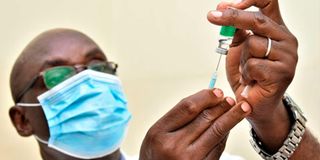26 million targeted for jab in new plans

Coast General Teaching and Referral Hospital nurse Joseph Kenga prepares to administer a Covid-19 vaccine April 13, 2021.
What you need to know:
- Aim is to achieve herd immunity to enable the economy to reopen.
- Drop in severe disease, hospitalisation and deaths is among expected outcomes.
Kenya has revised its Covid-19 vaccination plan and now aims to have an extra 10 million people vaccinated against the disease by June next year.
The National Vaccines and Immunisation Programme says it intends to ramp up the exercise to cover 26 million adult Kenyans by June next year, with hopes to help the country achieve herd immunity and have the stringent restrictions imposed to control the virus lifted.
“By the time we reach this figure we project that the burden due to deaths and severe disease will have been lifted and we’ll have reached herd immunity to restart our economy,” said Dr Collins Tabu, the head of the programme.
The country had initially targeted to vaccinate 16 million vulnerable Kenyans by June 2022.
Dr Tabu says the country will use up all the vaccines in its possession as it awaits a second shipment from the UN-backed Covax facility, expected to arrive in May.
About 525,000 people have received the first shot of AstraZeneca and Sputnik V jabs.
According to Dr Willis Akhwale, chairman of the Covid-19 vaccines deployment and vaccination task force, the uptake has been “so good” that the country could deplete its stock in the coming 10 days.
Hospitalisation and deaths
“We did not have the luxury of stretching them (doses) until the next shipment. This is because we needed to have as many vulnerable people vaccinated and had to use up the doses before they expired,” explained Dr Tabu in a TV interview.
According to mathematical projections, Dr Tabu added, the team intends to increase the current scope of vaccinated people because “we want to cut deaths, severe disease in hospitals and go back to normalcy”.
A drop in severe disease, hospitalisation and deaths is among expected outcomes of the vaccination campaign globally.
The world aims to achieve herd immunity so as to keep vulnerable people who cannot get vaccinated (for instance, due to health conditions like allergic reactions to the vaccine) safe and protected from Covid-19.
To safely achieve herd immunity against Covid-19, a substantial proportion of a population would need to be vaccinated, lowering the overall amount of the virus that is able to spread in the whole population. To do this, Kenya initially intended to vaccinate about 16 million people (30 percent) by 2023.
“Our intention is to reach over 80 percent of the at-risk population in order to break transmission and achieve maximum throughput before our doses expire,” Dr Tabu told journalists.
While Kenya’s vaccination drive is aligned to the world’s target, Dr Akhwale said the Ministry of Health has laid out specific objectives it intends to achieve in the short and long term.
“Our short-term goal is to significantly reduce intensive care unit (ICU) cases and lower infections,” Dr Akhwale said in an interview with Nation. This, he said, should happen in three to six months.
Available vaccine doses
To achieve this, the country is using the available vaccine doses to inoculate people 60 and older, as well as front-line workers like doctors and nurses.
Recent data shows about 71 percent of the 2,276 fatalities recorded in the country have occurred in people above 50 years.
Further, the ministry intends to reduce the number of Covid-19 patients in need of ICU beds. Compared to last year when the country was in the first wave, most hospitals have run out of ICU space.
Health facilities are fast getting overwhelmed with critically ill patients who need admission, forcing hospitals to set aside other rooms for the patients.
Even before the global crisis began, Kenya’s health system was already limping with few doctors and nurses and even fewer hospital beds per capita.
Of the 518 ICU beds, 87 percent are currently occupied. As of April 7, there were 236 Covid-19 patients in ICUs.
The long-term goal, Dr Akhwale said, is to interrupt and reduce the spread of Covid-19 in the country in a year.
This means that, if the country ramps up its daily vaccination numbers to the intended 15,000 vaccines daily, from the current 9,000, then it might just be able to return to the pre-pandemic situation.





